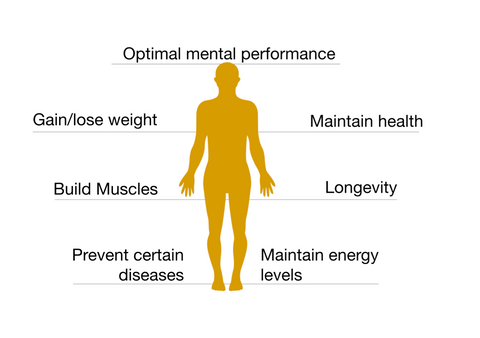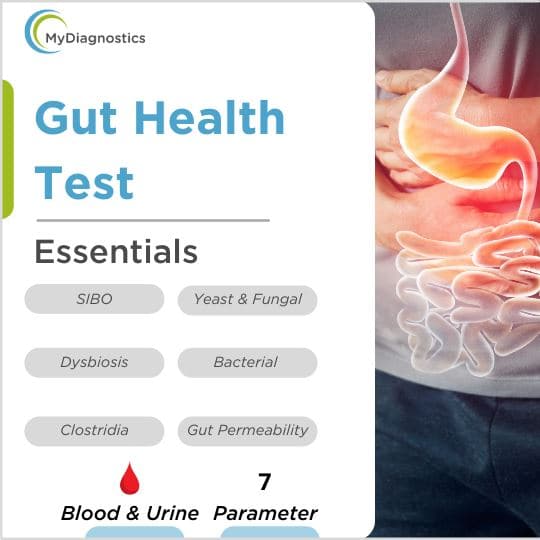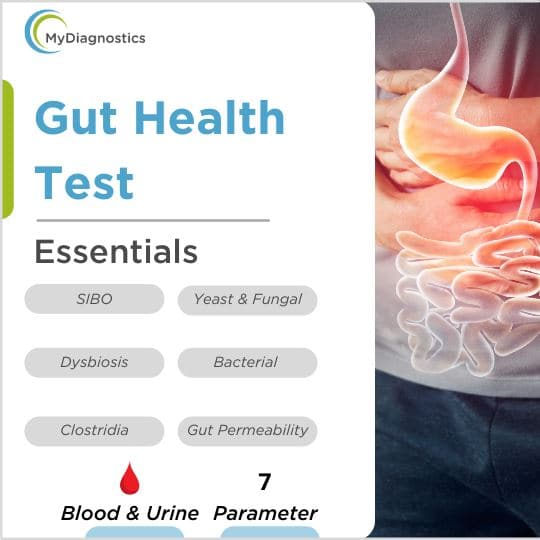Gut Health Test - Leaky Gut Diagnosis At Home
Test Parameters

About the Gut Health Test
Human metabolism is a dynamic concept. Your lifestyle, eating habits, environment, exercises, stress-and all such factors have an impact on it. The Nutritional Metabolism Test gives you an insight into the current status of your metabolism, and what all needs to be done in order to improve it. If you undergo any major change in your nutrition and lifestyle, or if you are undergoing an intensive weight-loss program, it is best to take the test at regular intervals and keep a close watch on your essential metabolic markers in order to ensure that they remain in “normal limits”.
Gut Health & Metabolism
Your health is a reflection of your gut health. Conversely, it also is reflective of the nutrients (certain vitamins and minerals) which you may not be consuming, but need for better health and disease prevention. There are many variables which determine the efficiency behind your nutrition. It is important to understand whether your nutrition is adequate for the health that you aim to achieve, or whether there is any deficiency. It is also important to understand whether there is any “metabolic block” which calls for a change in nutrition, lifestyle and approach to building/ maintaining health.

Dysbiosis Marker & Risk
The GI tract is a complex organ system easily influenced by factors such as microflora and microbial balance, digestive enzymes, or GI lining integrity. Over a period of time, toxins and food allergens entering the bloodstream create an imbalance between good and bad bacteria, a phenomenon called Dysbiosis.
Gut Permeability or Leaky Gut Markers
Intestinal Malabsorption
The main role of your small intestine is to absorb nutrients from the food you eat into your bloodstream. Malabsorption syndrome refers to a number of disorders in which the small intestine can’t absorb enough of certain nutrients and fluids.
Clostridia Bacterial Overgrowth
Clostridium Difficile - found in our intestines and released toxins that causes intestinal lining disruption and diarrhoea. Many people contract C. difficile is that by eating contaminated meat or vegetables.
Yeast & Fungal Infection
There are hundreds of different types of yeast and the most common form of yeast infection is known as Candida albicans. The problem occurs when there is too much Candida in relation to your body’s good bacteria, and it overpowers the bacteria, which can lead to leaky gut and a host of other digestive issues, as well as fungal infections, mood swings, and brain fog
Bacterial Overgrowth
Bacterial overgrowth occurs when there is a significant increase in the bacterial population in the small intestine and stomach. One common cause of bacterial overgrowth is the underproduction of gastric acid which limits bacterial growth in the stomach and upper small intestine. The consequences of bacterial overgrowth are numerous, including vitamin deficiencies, and carbohydrate malabsorption
Why is Gut Health Important
Having the right gut health, good gut bacteria, and a healthy gut microbiome is one of the best ways to improve overall health, longevity, and regulation of functioning. The gut microbiota controls a large number of functions within the body that can impact energy, mental health, and chronic disease. Issues in the gut can lead to complex problems later on, which can worsen over time. Having the right bacteria in the gut is essential to a healthy life.

Is Gut Health Test right for me ?
A gut health test is the preliminary way to determine the presence of healthy gut bacteria in the body. It can also provide insights in the case that you are suffering from chronic bloating, constipation, sensitive stomach, flatulence, reflux, and nausea. You should also get a regular gut health test done if you want to ensure that the gut microbiota in your body is optimal for your lifestyle. There is also a key connection between healthy bacteria in the gut and longevity, which is why having a gut health test done is optimal.
Is the report simple enough to understand? Will it include the recommendations? Do I need someone’s assistance to implement the recommendations?
The report is comprehensive but simple to understand. It will have guidelines and recommendations wherever there is an abnormal finding. However, the best way to implement the recommendations is to route through your family physician or a nutritionist.






